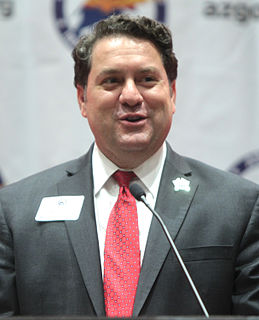
The Federal Trade Commission (FTC) is an independent agency of the United States government, established in 1914 by the Federal Trade Commission Act. Its principal mission is the promotion of consumer protection and the elimination and prevention of anticompetitive business practices, such as coercive monopoly. It is headquartered in the Federal Trade Commission Building in Washington, D.C.
Proposition 65 is a California law passed by direct voter initiative in 1986 by a 63%–37% vote. Its goals are to protect drinking water sources from toxic substances that may cause cancer and birth defects and to reduce or eliminate exposures to those chemicals generally, for example in consumer products, by requiring warnings in advance of those exposures.

Proposition 76 was a ballot proposition in the state of California in the referendum election. It involves school funding, state spending, and is an initiative constitutional amendment.

Proposition 75 was a ballot proposition in the California special election, 2005.
A bad check restitution program (BCRP) is a program in the United States that works to retrieve funds from bad check writers in order to repay moneys owed to the recipients of the checks. In other words, these are debt collection operations. Many of these programs are operated by private companies that add fees that may exceed $200, regardless of the amount of the check. They call these operations "bad check enforcement," or "bad check restitution," or "bad check diversion." Sometime, these programs are actually run in house by real prosecutors. The private companies send check writers letters which state basically, that to avoid being prosecuted, the check writer may enroll in an expensive diversion program. In most instances, the prosecution threats are false and made only to coerce payment of high fees.
Proposition 83 of 2006 was a statute enacted by 70% of California voters on November 7, 2006, authored by State Senator George Runner and State Assemblywoman Sharon Runner. It was proposed by means of the initiative process as a version of the Jessica's Law proposals that had been considered in other states.
In regulatory jurisdictions that provide for it, consumer protection is a group of laws and organizations designed to ensure the rights of consumers as well as fair trade, competition and accurate information in the marketplace. The laws are designed to prevent the businesses that engage in fraud or specified unfair practices from gaining an advantage over competitors. They may also provide additional protection for those most vulnerable in society. Consumer protection laws are a form of government regulation that aim to protect the rights of consumers. For example, a government may require businesses to disclose detailed information about products—particularly in areas where safety or public health is an issue, such as food.

California's state general elections were held November 5, 1996. Necessary primary elections were held on March 26, 1996. Up for election were all eighty (80) seats of the State Assembly, twenty (20) seats of the State Senate, and fifteen (15) statewide ballot measures.

California Proposition 7, would have required California utilities to procure half of their power from renewable resources by 2025. In order to make that goal, levels of production of solar, wind and other renewable energy resources would more than quadruple from their current output of 10.9%. It would also require California utilities to increase their purchase of electricity generated from renewable resources by 2% annually to meet Renewable Portfolio Standard (RPS) requirements of 40% in 2020 and 50% in 2025. Current law AB32 requires an RPS of 20% by 2010.

Dennis Herrera is the elected City Attorney of San Francisco, perhaps best known for his longtime legal advocacy for same-sex marriage in California, including the In re Marriage Cases, 43 Cal.4th 757 (2008), and Hollingsworth v. Perry, 570. U.S. (2013), also known as the legal fight against Proposition 8. He was first elected as City Attorney in 2001, and re-elected without opposition in 2005, 2009, 2013 and 2015. He ran unsuccessfully for Mayor of San Francisco in the 2011 election, finishing third in the City's ranked-choice voting system.
Consumer Watchdog is a non-profit, progressive organization which advocates for taxpayer and consumer interests, with a focus on insurance, health care, political reform, privacy and energy.

Proposition 23 was a California ballot proposition that was on the November 2, 2010 California statewide ballot. It was defeated by California voters during the statewide election by a 23% margin. If passed, it would have suspended AB 32, a law enacted in 2006, legally referred to its long name, the Global Warming Solutions Act of 2006. Sponsors of the initiative referred to their measure as the California Jobs Initiative while opponents called it the Dirty Energy Prop.

Proposition 37 was a California ballot measure rejected in California at the statewide election on November 6, 2012. This initiative statute would have required labeling of genetically engineered food, with some exceptions. It would have disallowed the practice of labeling genetically engineered food with the word "natural." This proposition was one of the main concerns by the organizers of the March Against Monsanto in May 2013.
In addition to federal laws, each state has its own unfair competition law to prohibit false and misleading advertising. In California, one such statute is the Unfair Competition Law [hereinafter “UCL”], Business and Professions Code §§ 17200 et seq. The UCL “borrows heavily from section 5 of the Federal Trade Commission Act” but has developed its own body of case law.

Mark Brnovich is an American lawyer and politician from the state of Arizona who currently serves as the 26th Attorney General of Arizona. A member of the Republican Party, he was elected to the office on November 5, 2014, defeating Democratic nominee Felecia Rotellini. Brnovich advanced from the August 28, 2018 Republican primary as the top vote-getter in the state, running unopposed. Brnovich's family is originally from Montenegro. On November 6, 2018, Brnovich defeated Democrat January Contreras to be elected to a second term as attorney general. Brnovich is married to Susan Brnovich, a former Maricopa County Superior Court Judge who was nominated by President Trump in January 2018 and confirmed by the United States Senate as a United States District Judge of the United States District Court for the District of Arizona in October 2018.

Proposition 218 was an adopted initiative constitutional amendment in the state of California on the November 5, 1996 statewide election ballot. Proposition 218 revolutionized local and regional government finance in California. Called the “Right to Vote on Taxes Act,” Proposition 218 was sponsored by the Howard Jarvis Taxpayers Association as a constitutional follow-up to the landmark Proposition 13 property tax revolt initiative constitutional amendment approved by California voters on June 6, 1978. Proposition 218 was drafted by constitutional attorneys Jonathan Coupal and Jack Cohen.

California state elections in 2018 were held on Tuesday, November 6, 2018, with the primary elections being held on June 5, 2018. Voters elected one member to the United States Senate, 53 members to the United States House of Representatives, all eight state constitutional offices, all four members to the Board of Equalization, 20 members to the California State Senate, and all 80 members to the California State Assembly, among other elected offices.






